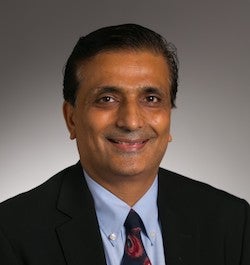What will be the next trillionaire company?
With Apple’s (NASDAQ: AAPL) market value hitting $1 trillion, what corporations may join them in the trillionaire club? Amazon.com (NASDAQ: AMZN), Alphabet Inc. (NASDAQ: GOOG) and Microsoft (NASDAQ: MSFT) are all close.
If you look at the rest of the top 10, seven of them are technology corporations, and these three — Berkshire Hathaway (NYSE: BRK.A), JPMorgan Chase (NYSE: JPM), and ExxonMobile (NYSE: XOM) — are not tech-focused, and come in at the bottom of the list.
With so many technology companies having the largest equity values on the market, what does this mean for the economy and other corporations and businesses? USC experts answer this question and others on this timely topic.
Contact: Jeremy Pepper at (213) 740-8606 or pepper@usc.edu
Disruption is leading to disenfranchisement
 “In this new knowledge economy, innovative companies are being rewarded at a much greater valuation than traditional companies.
“In this new knowledge economy, innovative companies are being rewarded at a much greater valuation than traditional companies.
“This trend further illustrates the distinction between those that are disrupting and those being disrupted—the challenges the economy and country will face are how will we (a) ensure a safety net for disenfranchised stakeholders and (b) provide them training and retooling to participate in the new economy.”
Nick Vyas is the executive director and co-founder of the Center for Global Supply Chain Management, academic director of MS in global supply chain management, and assistant professor of clinical data sciences and operations at the USC Marshall School of Business. Vyas is an expert in global trade, supply chain management, and business operations.
Contact: (213) 821-4079, (323) 816-5145 or nick.vyas@marshall.usc.edu
Protecting domestic competitors against U.S. big tech
 “As the big tech-related companies become more dominant in the global marketplace, we are seeing other countries increasingly using non-tariff barriers such as regulatory regimes to protect their domestic competitors.
“As the big tech-related companies become more dominant in the global marketplace, we are seeing other countries increasingly using non-tariff barriers such as regulatory regimes to protect their domestic competitors.
“One such example is the use of antitrust laws by the anti-monopoly/competition policy regulators in other countries to fine U.S. big tech companies and impose requirements to break up their market dominance, such as the recent EU fines and restrictions imposed on Google for their Android system in the EU market.”
Brian Peck is the director of the Transnational Law and Business Center at the USC Gould School of Law, which promotes world-class policy analysis and debate to help international businesses in trade and compliance issues. He is also an adjunct assistant professor of law at the USC Gould School. Peck is an expert in international trade, trade agreements and globalization and teaches international trade policy and international intellectual property.
ontact: (213) 740-2563 or bpeck@law.usc.edu
With great economic and social power comes great responsibility
 “The extraordinary growth in technology companies should both gladden and concern consumers. These companies are producing highly desired products that are transforming our economy.
“The extraordinary growth in technology companies should both gladden and concern consumers. These companies are producing highly desired products that are transforming our economy.
“But their popularity has given them great economic and social power that they can use both for good or bad.”
Lawrence Harris is the Fred V. Keenan Chair in finance and a professor in finance and business economics and the USC Marshall School of Business. Harris is an expert in stock markets, investment, regulation, corporate finance and economic forecasting.
Contact: (213) 740-6496, (323) 244-1154 or lharris@usc.edu
Success can be a curse for tech companies
 “Apple reached a $1 trillion market cap because it has consistently delivered novel, useful, and easy-to-use products through unrelenting innovation. Likewise Amazon, Google and Microsoft are approaching this threshold due their own radical innovations in varied markets.
“Apple reached a $1 trillion market cap because it has consistently delivered novel, useful, and easy-to-use products through unrelenting innovation. Likewise Amazon, Google and Microsoft are approaching this threshold due their own radical innovations in varied markets.
“The moment any of them stops innovating, they will stumble and fall — as did Kodak, HP, Nokia, Blackberry, Sony, and many other tech giants of just a few years back. Success is not guaranteed. On the contrary, success can be a curse because it can blind you to the next big innovation on the frontier.”
Gerard J. Tellis is the director of the Center for Global Innovation at the USC Marshall School of Business, the Neely Chair of American Enterprise and a professor of marketing, management and organization at the USC Marshall School. Tellis focuses on product innovation and market entry as both a marketing researcher and enterprise expert.
Contact: (626) 333-1981, (323) 244-1154 or tellis@usc.edu
Societal challenges are as real as the opportunities
 “It’s come to this: all the world’s an app, or will be, and it all runs on a technological infrastructure of nearly-frictionless electronic transmission and reproduction. That leads inevitably to gargantuan size and enormous profits, because the more people a single enterprise can touch, the greater its profits.
“It’s come to this: all the world’s an app, or will be, and it all runs on a technological infrastructure of nearly-frictionless electronic transmission and reproduction. That leads inevitably to gargantuan size and enormous profits, because the more people a single enterprise can touch, the greater its profits.
“None of this is the least bit new — yet all of it is. Software is a universal catalyst, an enabler that turns almost everything intangible, sublimating it all into bytes that can be transmitted and reproduced at almost no cost, but resulting in very real profits. Even the money itself is intangible, but the challenges — income and wealth inequality, cyber crime, asymmetric empowerment of terrorists, fake news and more — are as real as the opportunities.”
Jonathan Handel is a lecturer at the USC Gould School of Law, and practices transactional entertainment and technology law at TroyGould in Los Angeles. Handel is also a former computer scientist, and an expert in entertainment and technology law.
Contact: (323) 650-0060 or jh@jhandel.com
Silicon Valley is undermining democracy
 “Building their businesses to scale by tolerating piracy while at the same time promoting opaque business practices and subordinating the individual privacy of their users, the founders of Facebook, Google, and Amazon have together built a way of doing business predicated on surveillance marketing, one in which more creative content is being consumed than ever before but less revenue is flowing to those who make and own the content.
“Building their businesses to scale by tolerating piracy while at the same time promoting opaque business practices and subordinating the individual privacy of their users, the founders of Facebook, Google, and Amazon have together built a way of doing business predicated on surveillance marketing, one in which more creative content is being consumed than ever before but less revenue is flowing to those who make and own the content.
“Just as importantly, Facebook and Google’s YouTube have become the primary platforms for the propaganda and fake news that are undermining our democracy.
“My book — Move Fast and Break Things: How Facebook, Google and Amazon Cornered Culture and Undermined Democracy — goes deeper into the story of how and what these companies have done.”
Jonathan Taplin is the director emeritus of the USC Annenberg Innovation Lab, and an expert in entertainment business, the internet and popular culture, and the influence of the news media on the economy.
Contact: (310) 779-2248 or jtaplin@usc.edu



